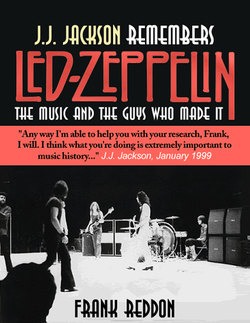Читать книгу J.J. Jackson Remembers Led Zeppelin: The Music and The Guys Who Made It - Frank Ph.D Reddon - Страница 3
Preface
ОглавлениеLed Zeppelin’s music has been a passion for most of my life. While conducting research for my book, Sonic Boom: The Impact of Led Zeppelin. Volume 1 – Break & Enter, I happened to meet a wonderful source of information at the Boston Public Library.
Pat Seward wasn’t a librarian, but a kind hearted, generous and free-spirited patron whose second home was the library’s microfiche department where we met. She spoke to me at great length about the club scene in Boston during the late 1960s. An art history major at the time, she was right into the music with her fellow college students.
She directed me to the original location of The Boston Tea Party at 53 Berkeley Street, where Led Zeppelin performed January 26-29, 1969. She introduced to me the name of Chet Helms. It would be several years before I tracked down that particular lead but, when I did, it opened up the whole West Coast and led me to the most amazing people, stories and research treasures.
Most importantly to the story I’m about to tell you now, Pat dropped the name of J.J. Jackson. I had heard of him, but in connection to him being a VJ/DJ with Westwood One in Los Angeles.
Pat assured me that J.J. Jackson and Peter Wolf (later of J. Geils Band fame) were both on the scene at The Tea Party when Led Zeppelin performed there. Peter Wolf was playing in the venue’s house band, The Hallucinations; J.J. was working for radio station WBCN as a deejay.
It was not easy to get in touch with J.J. Jackson. It took about six months of contact and trust-building. It was time well spent! As it turned out, J.J. was indeed instrumental to Led Zeppelin’s success during those early years. He also became very close friends with the musicians.
That’s why he had been so wary of speaking to me initially. J.J. was an extremely loyal friend to Robert, Jimmy, John Paul and Bonzo. He would do nothing to breach their confidence.
Over the course of our correspondence, we developed a friendship based on our mutual love of Led Zeppelin’s music. J.J. was exceptionally generous with his time, recollections and inside anecdotes. He even sent me some photographs from his personal collection.
He really enjoyed listening to some of the live concert recordings in my collection. And he was absolutely thrilled to relive his past with Led Zeppelin this way! The more we talked, the more excited and enthusiastic he became about my research project. You can see for yourself as I share with you my interviews with him, in chronological order.
J.J. and I spoke three or four times, resulting in the six interviews presented here. The text of the first one you’re about to read appears in its entirety in Sonic Boom/Volume 1. The printed book features many more artefacts and illustrations; because of copyrights, permissions and other legalities, it was impossible to reproduce the fully illustrated account in this e-book.
In the second interview, J.J. provided me a detailed analysis of the music on Led Zeppelin’s self-titled debut album, which was released in North America by Atlantic Records on January 12, 1969 – just two weeks prior to Zep’s headlining run at The Boston Tea Party. This second interview will appear in full in my upcoming book, Sonic Boom: The Impact of Led Zeppelin. Volume 2 – You Shook U.S. The publication date has yet to be determined.
Please note that excerpts from this second interview have already appeared in the November 2007 issue of our online newsletter, the Enzepplozine. But the entire interview has never before been published. So, even if you read that issue of the Enzepplozine I just mentioned, you still won’t have read all the details you’re about to discover in this e-book.
Interviews 3 through 6 have never been made public before in ANY form. There’s plenty of brand-new information here to please and delight any Led Zeppelin fan or music scholar.
J.J. Jackson moved from the East Coast to the West, where he became one of the five first-ever video jocks for MTV. One of his fellow pioneers in the medium was Martha Quinn who remains a popular VJ to this day. We’re delighted that Ms. Quinn agreed to contribute her personal and professional recollections of her dear friend and colleague, J.J. in this edition of our e-book.
On a much sadder note…
J.J. Jackson passed away on March 18, 2004. I will always cherish the time he so generously spent with me, discussing our mutual musical interests and sharing his enthusiasm. It was a genuine privilege to have known him.
He was very anxious to see my book in print and I deeply regret that he never had the chance. I would like to dedicate this e-book to his memory with my most sincere appreciation for his friendship and support.
Now it’s time for you to enjoy J.J. Jackson’s inside look at the world of Led Zeppelin.
Feedback – good or bad – is always welcome. I’d love to hear what you think of these interviews.
C’mon. Let’s rock!
Frank Reddon, Author
Sonic Boom: The Impact of Led Zeppelin
